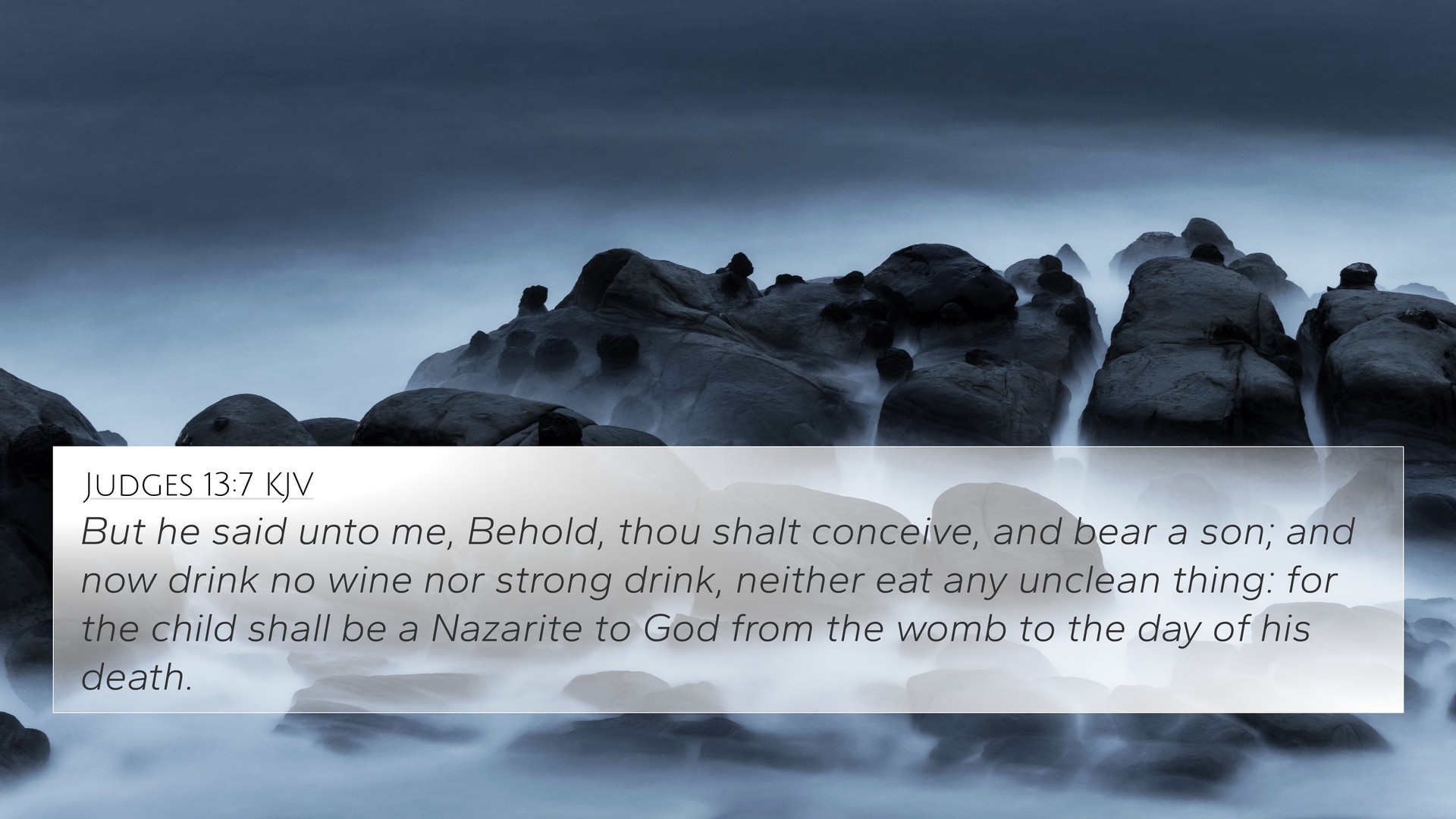Understanding Judges 13:7
Judges 13:7 is a pivotal verse in the biblical narrative, focusing on the announcement of the birth of Samson, a significant figure in the history of Israel. This verse captures God's assurance to Manoah's wife through a divine messenger, underlining themes of divine purpose, the importance of obedience, and the fulfillment of God's promises.
Verse Text
"But he said unto me, Behold, thou shalt conceive, and bear a son; and now drink no wine nor strong drink, neither eat any unclean thing: for the child shall be a Nazarite to God from the womb to the day of his death." (Judges 13:7)
Commentary Insights
This verse has been elaborated upon by several public domain commentators, including Matthew Henry, Albert Barnes, and Adam Clarke. Here are some insights gathered from their works:
-
Divine Announcement:
Albert Barnes highlights the uniqueness of the announcement, emphasizing that the birth of Samson was ordained by God for a specific purpose to deliver Israel from Philistine oppression.
-
Nazarite Vow:
Matthew Henry explains the significance of Samson being a Nazarite, indicating a life set apart for God, which required specific dietary restrictions and dedication to divine service.
-
Parental Responsibility:
Adam Clarke stresses the seriousness of the instructions given to Manoah’s wife, underlining the importance of adhering to divine guidelines for raising a child dedicated to God's purpose.
-
Symbol of Hope:
In the midst of Israel's turmoil, Matthew Henry notes that the promise of a deliverer in Samson represents hope and divine intervention in challenging times.
-
Spiritual Preparation:
Albert Barnes discusses the necessity for spiritual preparation, as the mother’s lifestyle choices were crucial for the sanctification required for bearing a Nazarite.
-
God's Sovereignty:
Adam Clarke illustrates God's sovereignty in choosing Samson and the way He orchestrates the lives of individuals to fulfill His divine plans.
-
The Role of Women:
The passage showcases God's ability to use women in pivotal roles, a point noted by Matthew Henry, who praises Manoah's wife as the chosen vessel for carrying out God's plan.
Bible Cross-References
This verse has several biblical connections that enhance its understanding and significance. Below are key cross-referenced verses:
- Numbers 6:2-4: This passage outlines the Nazarite vow, providing context for Samson's dedicated service to God.
- Luke 1:15: Similar to Samson, John the Baptist is also described as being filled with the Holy Spirit from his mother’s womb.
- Judges 13:5: Further elaborates on the divine instructions regarding Samson's birth and role as a deliverer.
- 1 Samuel 1:11: Hannah's vow when praying for a son, paralleling Manoah's wife's role in divine fulfillment.
- Matthew 1:20-21: The announcement of Jesus' birth is another instance of divine intervention assuring a miraculous birth.
- Isaiah 49:1: This verse speaks of God's calling before birth, displaying the theme of God's sovereign choice of individuals for special purposes.
- Galatians 4:4: Discusses God sending His Son at the right time, illustrating the connection between divine plans throughout history.
Thematic Connections
The themes presented in Judges 13:7 are prevalent throughout both the Old and New Testaments. They reveal the connections between divine announcements, the fulfillment of God’s promises, and the role of individuals set apart for holy purposes. Exploring these connections through cross-referencing can deepen one’s understanding of scripture.
Tools for Bible Cross-Referencing
To understand these connections further, one can utilize various tools and methods for Bible cross-referencing:
- Bible Concordance: A valuable tool to locate verses containing specific words or themes.
- Bible Cross-Reference Guide: Resources that provide listings of related verses and themes across scripture.
- Cross-Reference Bible Study: Methods to dive deeper into the spiritual nuances of interconnected verses.
- Bible Reference Resources: Utilize compendiums of information to understand contexts and themes throughout the Bible.
- Bible Chain References: A method that connects verses linked by similar themes, allowing for an enriched study of scripture.
Conclusion
Judges 13:7 serves not only as an announcement of Samson's birth but also as a profound reminder of God's sovereign plans and the significance of personal dedication to Him. By studying this verse in connection with others, one can unravel deeper theological insights and develop a greater appreciation for the narrative thread that runs through the Bible. Engaging with these tools for Bible cross-referencing enhances the journey of understanding the scriptures and the God who inspires them.



